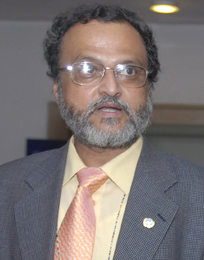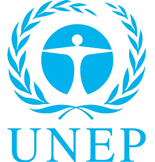Highlights from Friday, 3 November
|
On
Friday, delegates convened in preparatory and high-level sessions
to conclude the work of MOP-18. In the preparatory segment, delegates
agreed to forward a range of draft decisions to the high-level
segment, including draft decisions on: QPS; budgets; disclosure
of interest guidelines for bodies such as the TEAP and its TOCs;
the report of the experts' meeting on the reports of the IPCC
and TEAP; and Canada 's proposal to adjust the Montreal Protocol.
In the high-level segment, delegates heard statements by country
and international agency representatives and adopted the conference
report, before adopting more than 30 decisions. Plenary reconvened
late in the evening, when delegates adopted decisions on essential-
and critical-use nominations. MOP-18 Bureau President Malungula
thanked delegates, the Secretariat and others for their hard work,
and India for hosting the meeting, and gaveled the meeting to
a close at 9.54 pm.
|
| Gilbert Bankobeza, Ozone Secretariat, Elias Malungula, Democratic Republic of Congo, MOP-18 Bureau President, Marco González, Executive Secretary, Ozone Secretariat, and MOP-18 Bureau Vice-President Paul Krajnik, Austria |
| Gilbert Bankobeza, Ozone Secretariat, Elias Malungula, Democratic Republic of Congo, MOP-18 President, Marco González, Executive Secretary, Ozone Secretariat, and Paul Horwitz, Deputy Executive Secretary, Ozone Secretariat |
Abdul-Hakim Elwaer, Libya (left), highlighted its adoption of a national legislation for furthering implementation of its Protocol commitments. Makhdoom Syed Faisal Saleh Hayat, Federal Minister for Environment, Pakistan (center), noted that CTC phase-out remains an area of concern and that it has submitted a plan of action to the Secretariat and ImpCom. Dago Tshering, Bhutan (right), noted that its philosophy of gross national happiness encompasses more than just material needs and said that while his country is committed to the Vienna Convention and the Montreal Protocol, meeting the stipulated timeframes is a daunting task
|
Odette Kayitesi, Burundi (left), noted the importance of addressing illegal trade in ODS is causing fatalities in her country. Osama Ahmed Abdelbari, Sudan (right), suggested that while reducing CFC substances is a major challenge, Sudan has ratified all the ozone instruments and prepared a national plan for CFC phase-out
|
Ruisheng Yue, China (left), highlighted: differences between the experience of phasing out HCFCs and CFCs; the importance of continued financial assistance for Article 5 parties and addressing illegal trade; and its support for single-year exemptions for CUEs. Nik Kiddle, New Zealand, talks to delegates from Norway (right) |
Jose Vicente Pimentel, Brazil (left), said the international community must continue taking steps to implement the Protocol and consider difficulties faced by Article 5 countries. Zahid Ullah Hamdard, Afghanistan (right), noted assistance from UNEP, Germany and others in the preparation of his country's national phase-out plan, which was submitted to the thirty-seventh meeting of the ExCom.
|
| Poseci Bune, Minister for Environment, Fiji (left), asked for assistance for Pacific Island countries in disposing ODS stockpiles. Juliet Kabera, Rwanda, said Rwanda has listed CFCs on a prohibitive list of chemicals, which will cut down the ODS consumption in Rwanda, and that they need assistance in phasing out ODS. |
János Maté, Greenpeace Internationa (left) noted its concern that the Protocol was subject to inordinate influence of multi-national chemical corporations, making the playing field for non-HCFC alternatives to CFCs unlevel.
Ezra Clark, Environmental Investigation Agency (center), hoped a decision on the future of the Protocol would revitalize the Protocol, and expressed concern regarding the perverse incentives created by the Clean Development Mechanism with regards to HCFC production.
Didier Coulomb, International Institute of Refrigeration (right), highlighted the importance of energy efficiency and noted the need to develop refrigeration systems that use less fluids. |
 |
|
|
Rajendra Shende, UNEP,
gave an overview of UNEP's achievements with regard to the Protocol, emphasized the economic and development advantages of phasing out ODS, and noted the importance of achieving the remaining Protocol objectives. Noting that the Protocol is a cornerstone of the chemicals agenda and is a good example for other MEAs to follow, Suely Carvalho, UN Development Programme (UNDP) (center), said that chemical hazards pose a particularly large risk to developing countries. Steve Gorman, World Bank (right), suggested that tackling HCFCs and unwanted ODS needs a multisectoral approach at the national level. |
Laura Berón and Marcia Levaggi, Argentina (left)
Sidi Menad Si Ahmed, UN Industrial Development Programme (UNIDO), discussed its efforts to assist non-Article 5 parties in achieving their phase-out objectives. |
Marco González, Executive Secretary, Ozone Secretariat, and Paul Horwitz, Deputy Executive Secretary, Ozone Secretariat (left) and Environmental NGOs (right) |
MOP-18 Vice-President and Rapporteur Paul Krajnik, Austria, gaveling the decisions through (right) |
| Co-Chair Nadzri Yahaya, Malaysia, gaveling the Preparatory Meeting to a close |
| Book Launch with UNEP and the Italian Ministry of Foreign Affairs |
| Rajendra Shende, UNEP, and Giuliana Gasparrini, Italy , launch a special international issue of Industry and Formozione, on refrigeration and air conditioning, which addresses ozone protection, climate change and energy efficiency |
|



